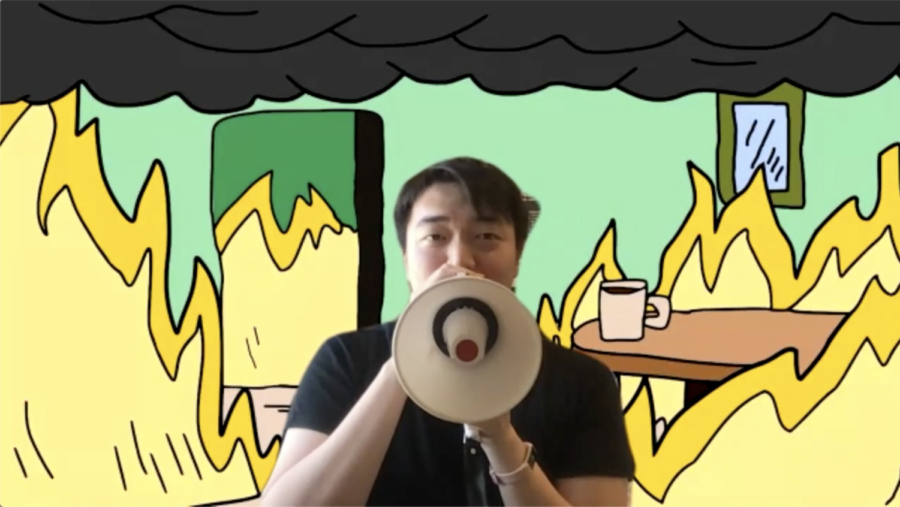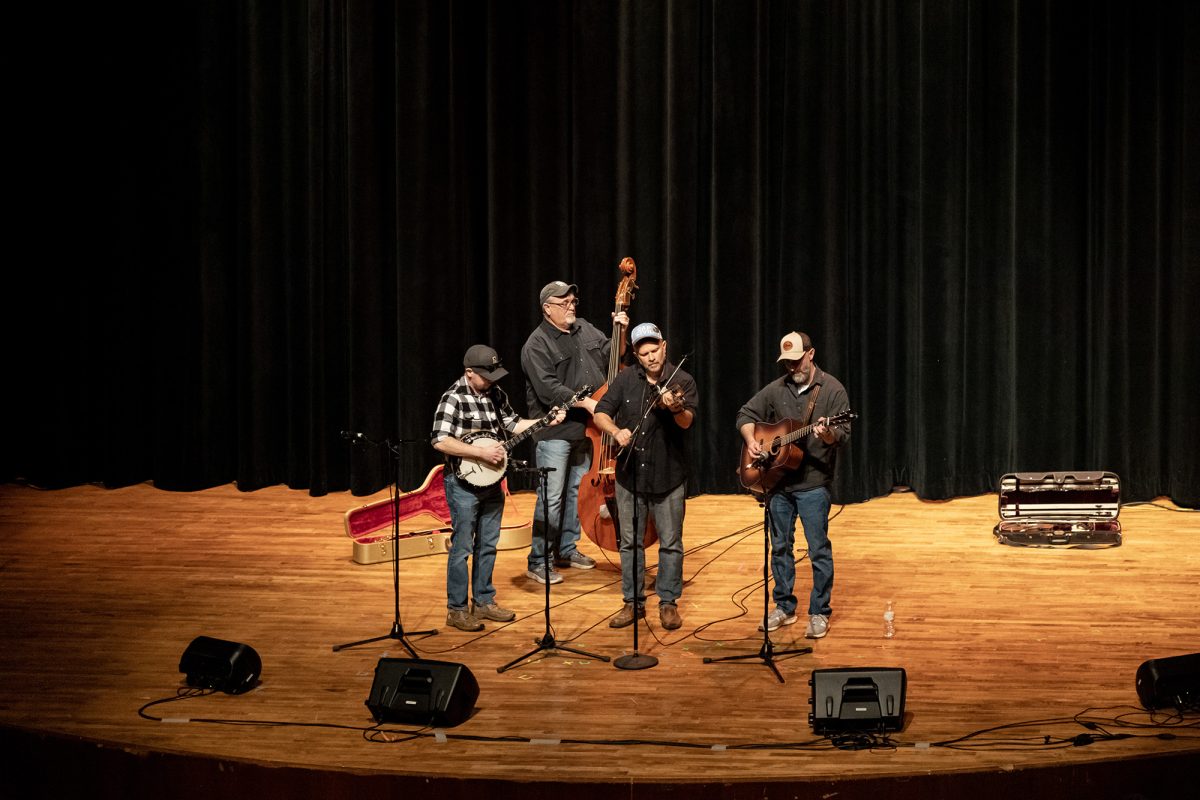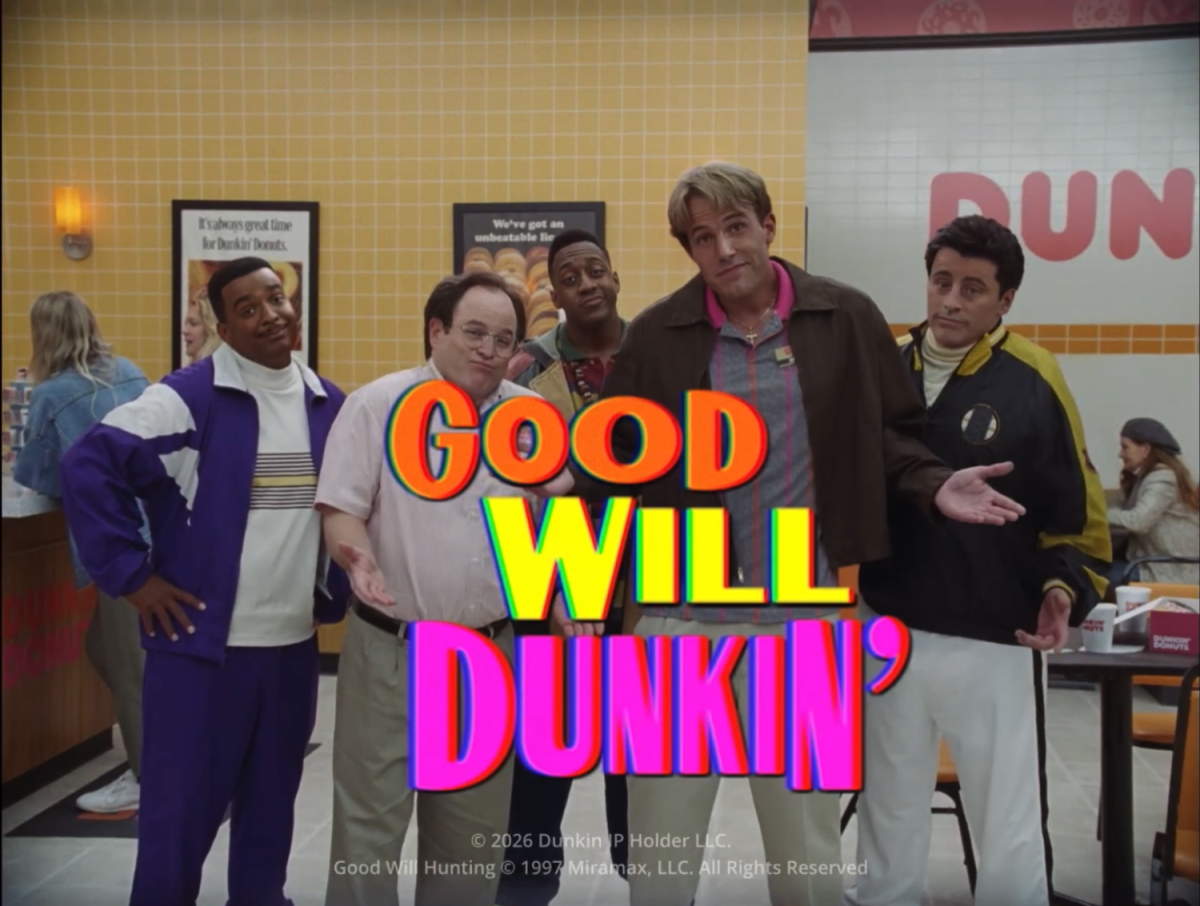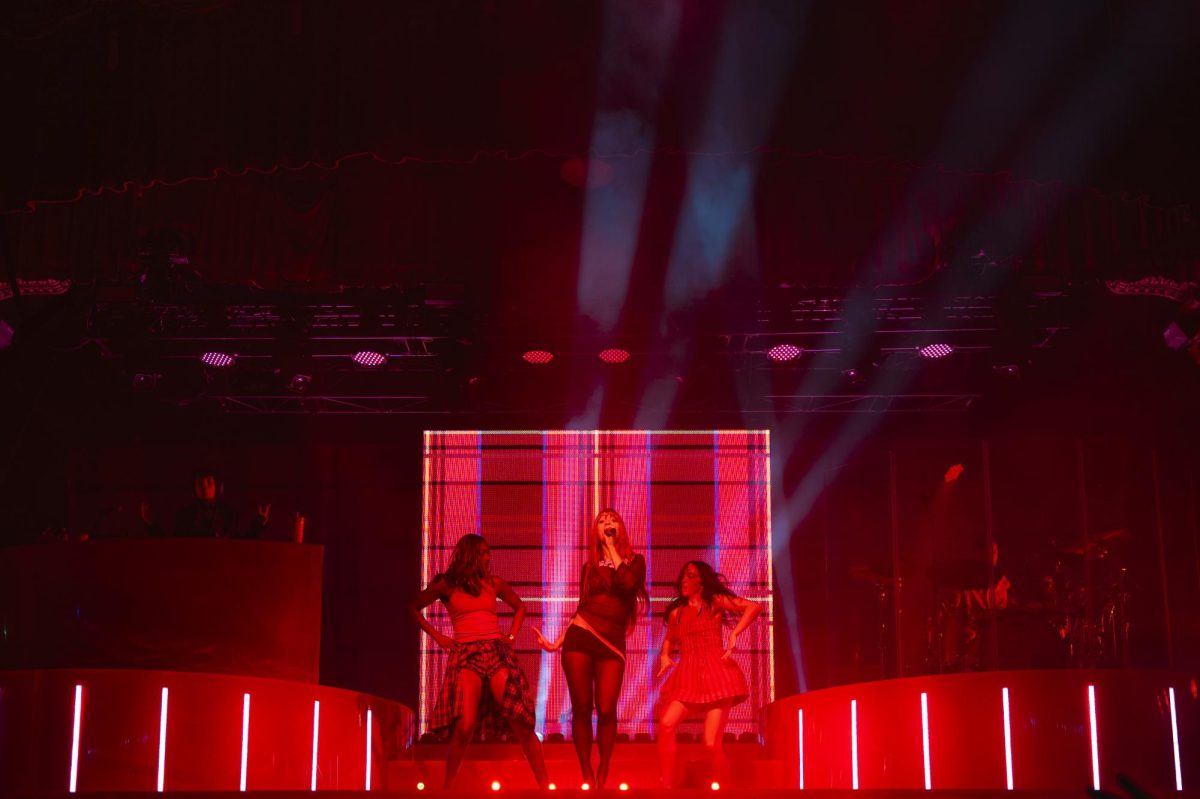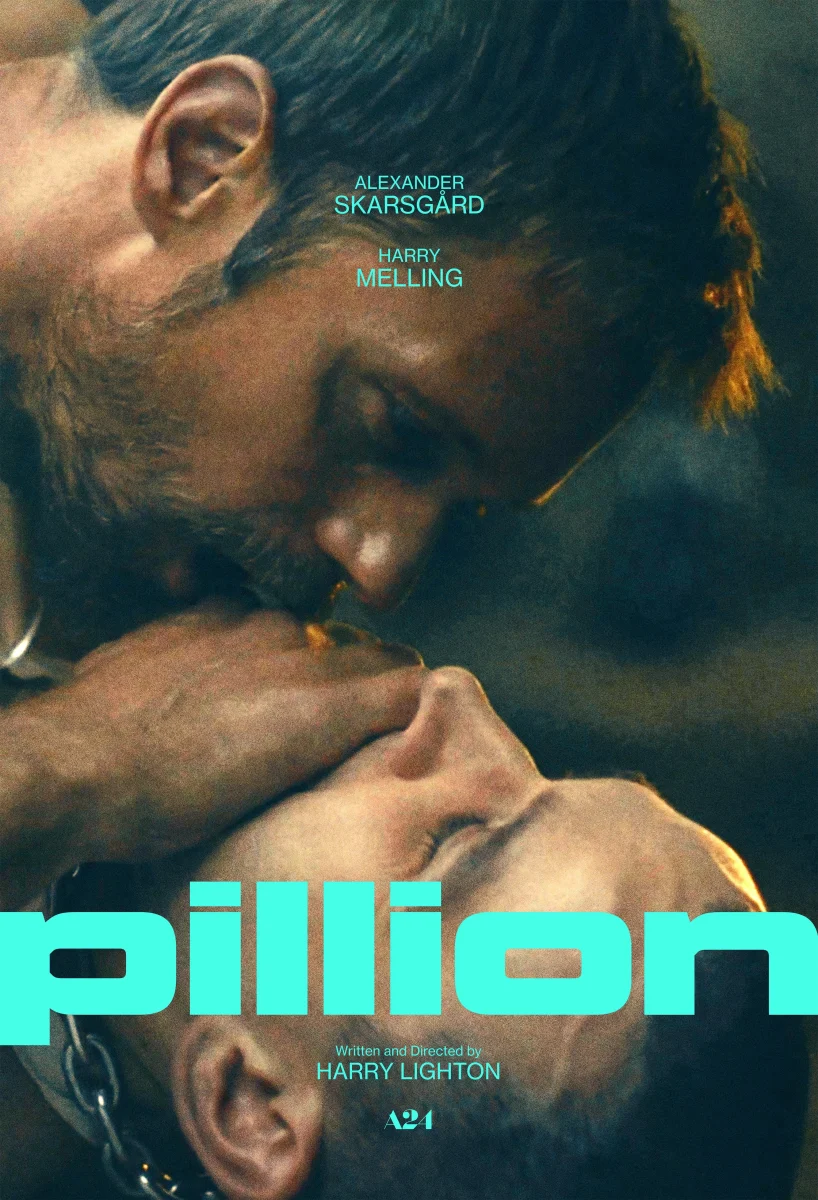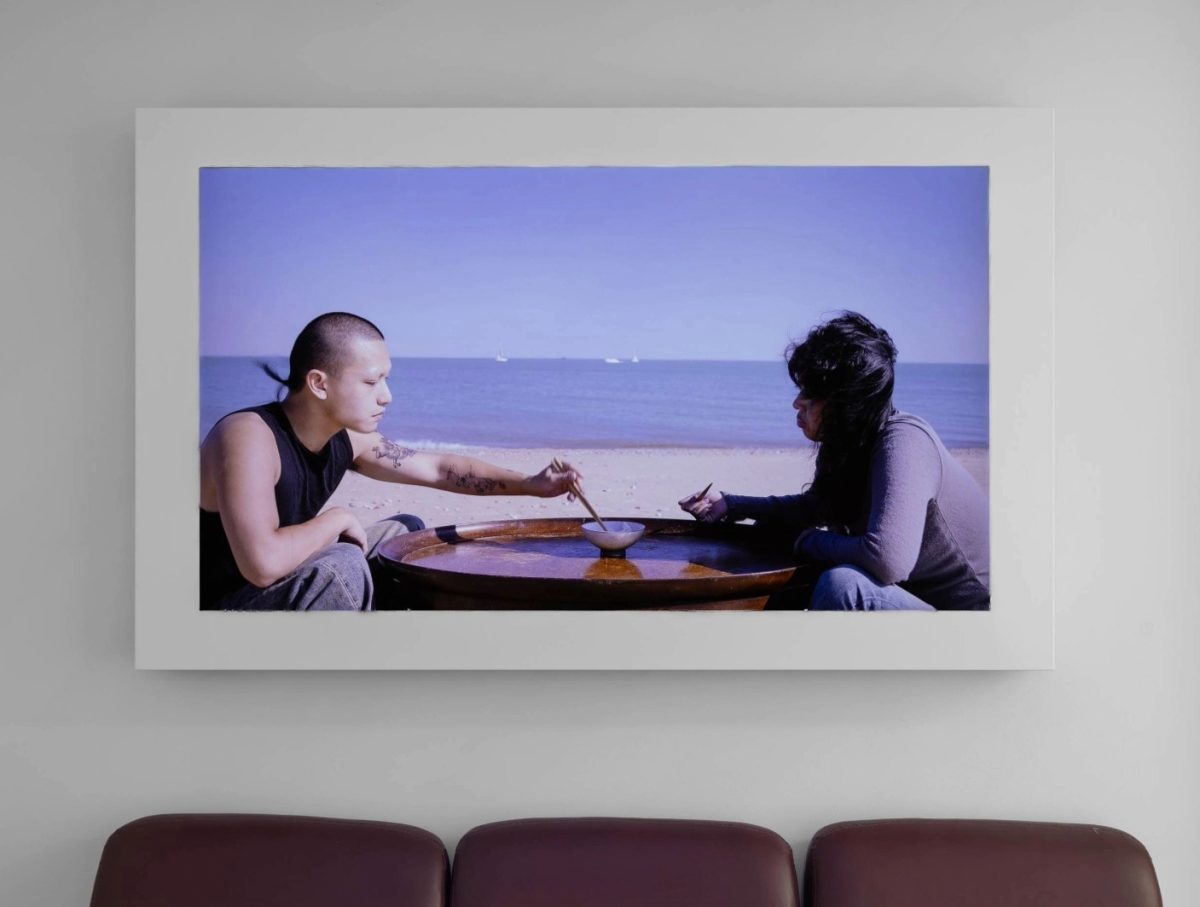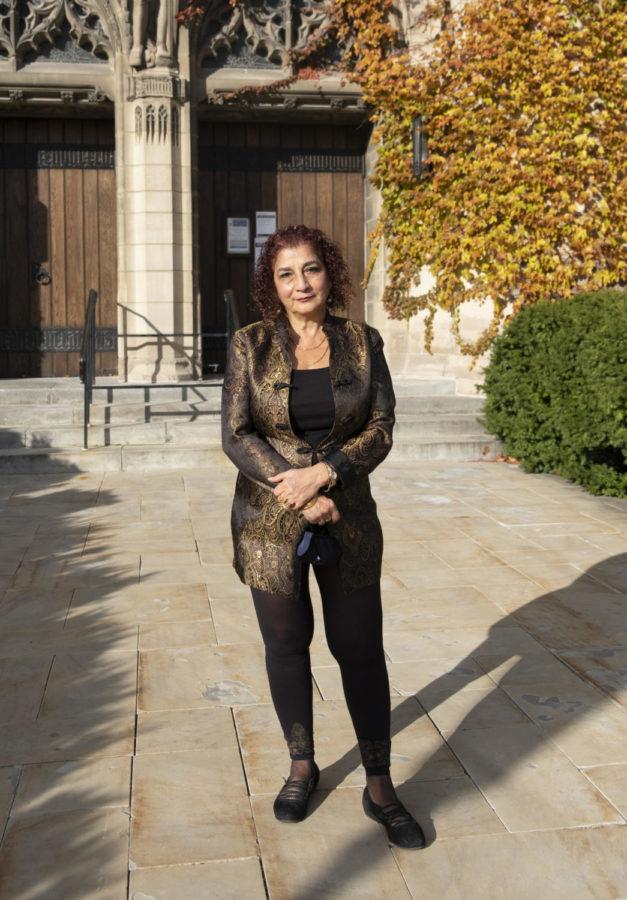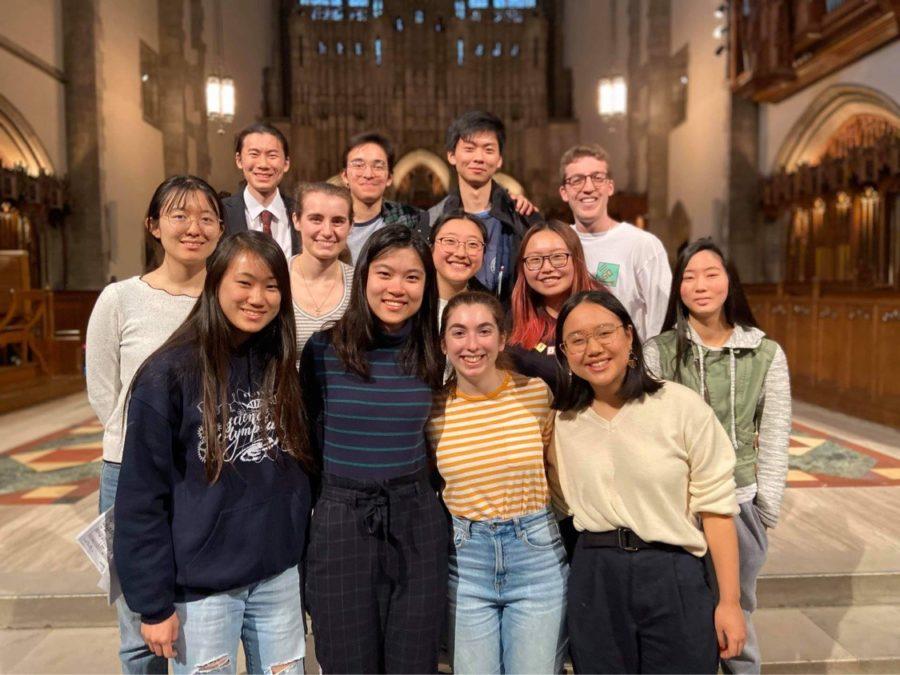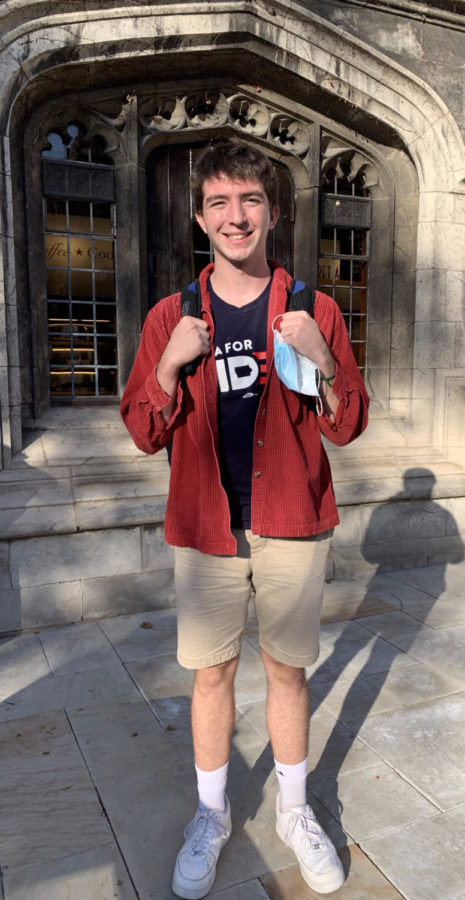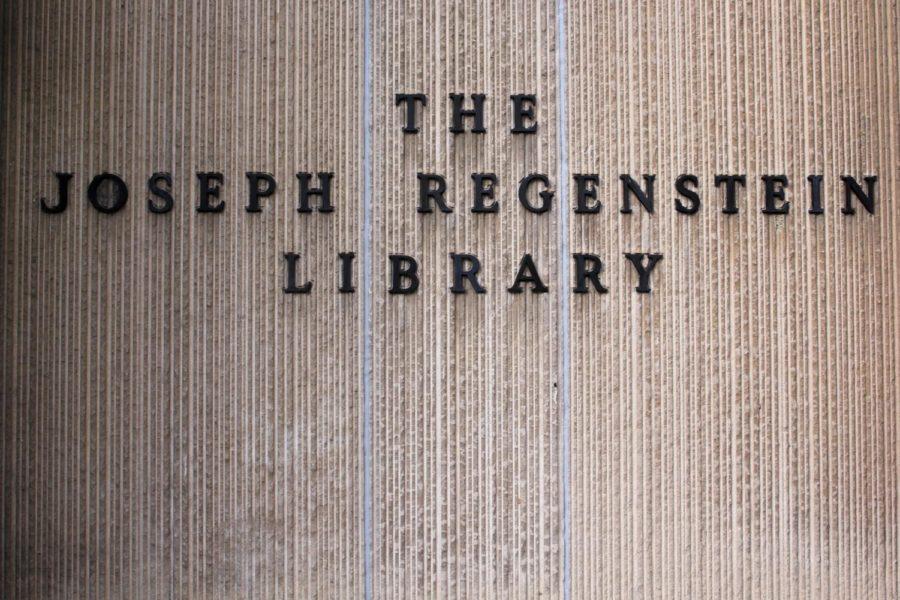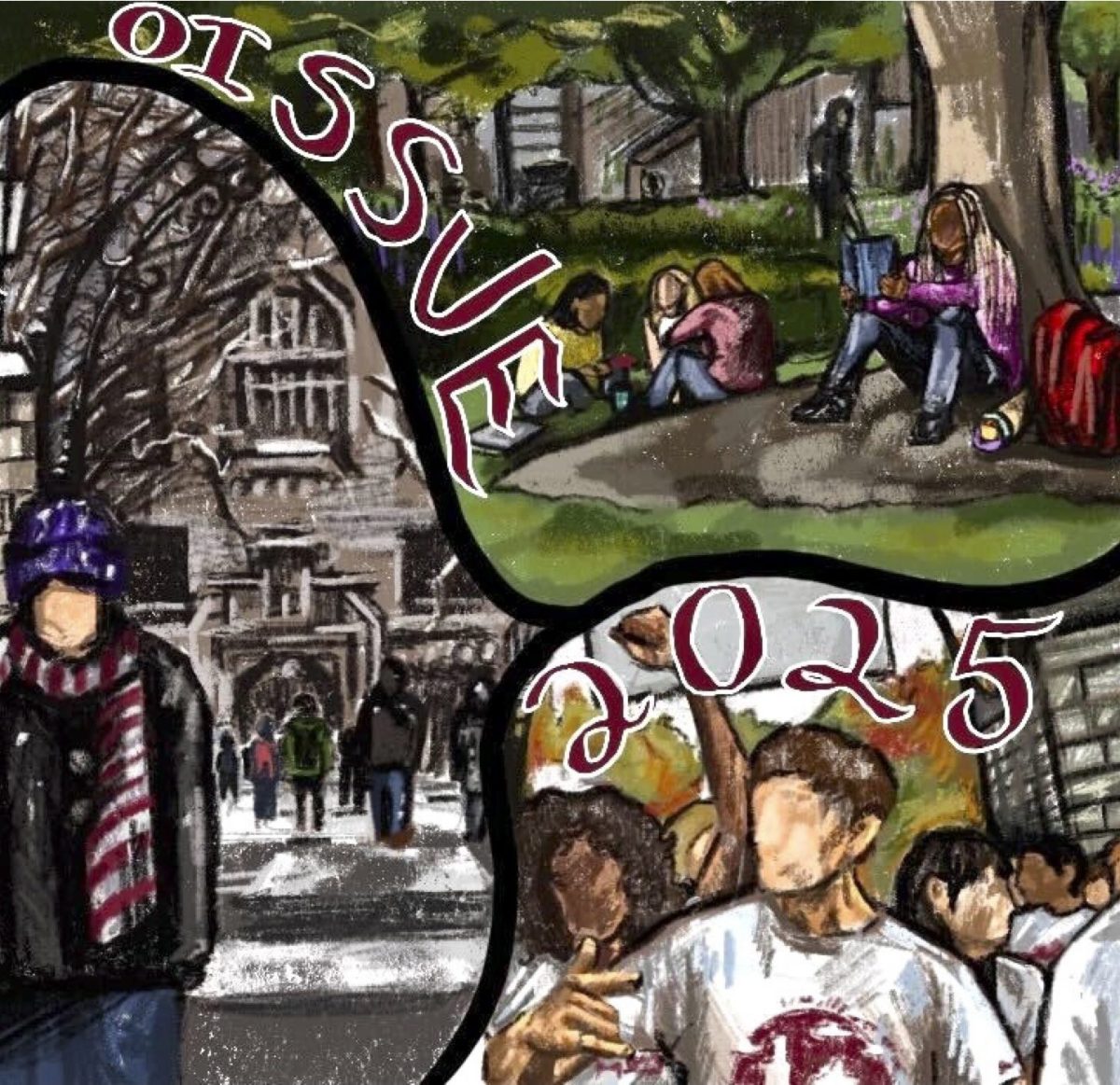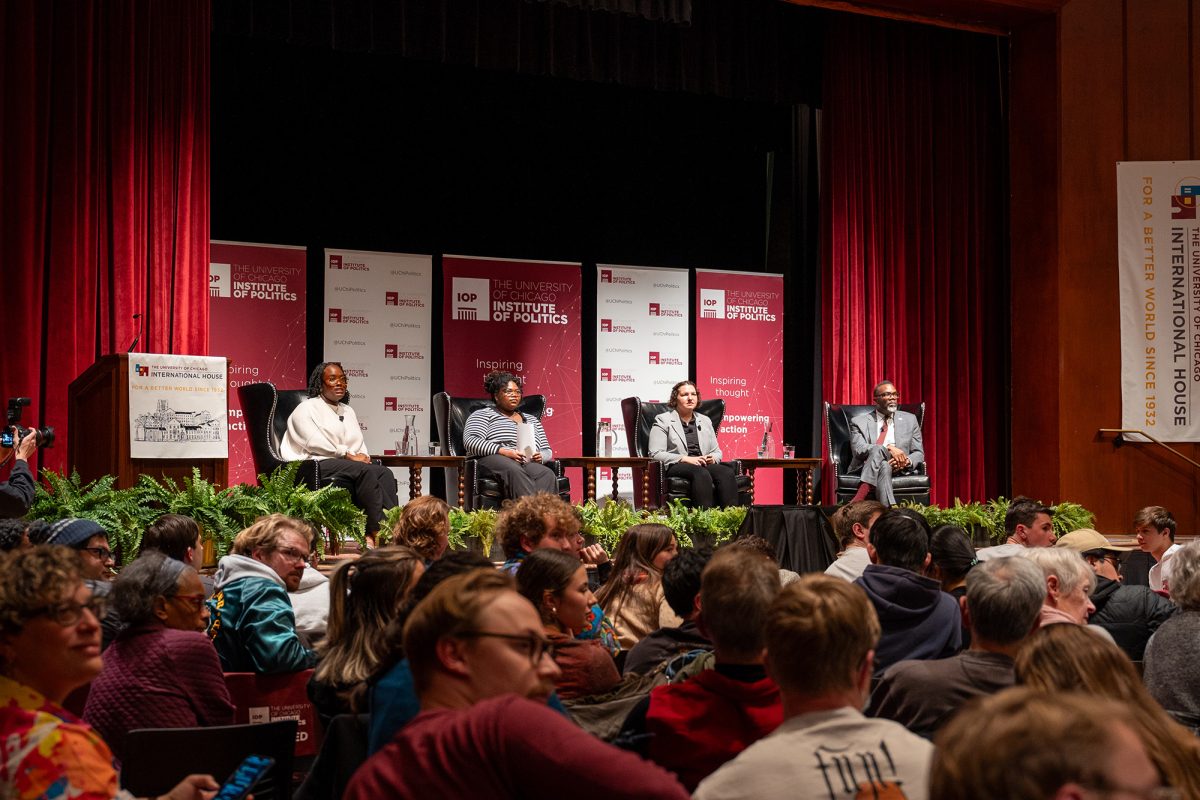In March 2020, the University of Chicago’s Class of 2020 was told to cope—with senior spring, convocation, and student artists’ exhibitions canceled, their ultimate (and penultimate) quarters ground to an unexpected and sudden halt. For Kenjiro Lee (A.B. ’20), that also meant bidding farewell to University Theater in March after a last bow as the director of The Old Man and the Old Moon (or, as he endearingly called it, OMOM).
From the physical absence of UChicago and the frustrations that come with a purely virtual world sprung the formula for his Zoom performance PRIMAL, which runs just over three minutes. Lee sits alone on a Zoom screen, the popular “This is Fine” meme flaming as his background, and shouts into a megaphone pointed directly at the audience.
“SOMETIMES WHEN I’M IN THE SHOWER, I COVER MY EARS AND JUST COWER FOR A FEW MINUTES, IMAGINING THE SPRAY OF WATER CASCADING ONTO MY HEAD IS ALL THE TROUBLES IN THE WORLD GETTING DEFLECTED!” Lee yells in one part of the monologue, followed by a softer reflection, “My hair’s not very absorbent. When I exercise, I’m covered in sweat.”
Quick, chaotic, and accessible, PRIMAL addresses the tension that comes with an ongoing pandemic. Its messiness is simultaneously jarring and comforting, relatable in its sporadic switches between political anger to a discussion on alcohol as we all navigate a seemingly directionless social milieu. Despite the distance between audience and performer, PRIMAL’s unpredictable, in-your-face, and loud message rings clear for those who tuned in: At least we all stay connected through a brief catharsis.
Ultimately, the play concludes with encouraged audience participation, in which Lee and the audience scream (to the point of breaching and breaking Zoom’s audio capacity) for five seconds. “Thank you for indulging me,” he adds before turning off his Zoom camera.
On January 29, Lee performed PRIMAL at the Smart Museum as part of the Beyond Pomp and Circumstance to the Problems of Our Time initiative. The Maroon sat down with Lee to discuss the inspirations behind his play, the world of virtual theater, and his theater career after UChicago.
Chicago Maroon: Where were you when the idea for PRIMAL came about?
Kenjiro Lee: PRIMAL was an assignment. I was doing the National Theater Institute Theatermakers Summer Intensive program. The National Theater Institute is an academic program from the Eugene O’Neill Theater Center in Waterford, Connecticut. I applied for it when it was going to be an in-person program. Obviously, that…did not shape out well in 2020, so I took it virtually. I took a class [called Structure] with Sarah Einspanier, a New York-based playwright. She gave us a challenge to write five plays over the course of five days, which is inspired by Suzan-Lori Parks’s 365 Days/365 Plays. These plays could be literally about anything. Anything.
So, I thought, “Okay. What am I feeling right now? What am I feeling about the current situation I’m in? I feel like…I wanna scream. I feel like I was cheated out of a senior spring. My graduation? Entirely virtual. I’m upset and would love nothing more than to scream about it in a play…Maybe this play can just be my screaming at the top of my lungs!” That’s when I basically word-vomited [onto] a Microsoft Word document. The main bulk of PRIMAL is pretty much what I wrote down on that day what I was feeling.
CM: Why the word “primal” instead of, say, “scream”?
KL: [The title] PRIMAL came about after I wrote it. The scream [at the end of the play] was already in there, but then I thought that this play is basically a primal scream. It reminded me of the UChicago tradition of going out to the [Nuclear Energy] sculpture near the Quad during finals week and just screaming. Now, that probably hasn’t happened recently on campus. I personally never participated in it because I was always studying. (Sorry.) In a way, I was thinking of UChicago by calling my play PRIMAL.
CM: Was the megaphone originally part of the play, or did it come in much later?
KL: Ah! The megaphone! I’ve actually been trying to figure out [when I put it in]. Mainly, this was inspired by a play by the Neo-Futurists in Chicago. In their INFINITE WRENCH show, one of the performers was screaming into a megaphone in front of the audience.
I thought, realistically, “If I’m ever going to perform PRIMAL, I don’t think I even own a megaphone. I don’t even want to go out looking for one. I think it will be effective just as is if I just shout at the top of my lungs.” But when I was preparing for an actual performance of PRIMAL, my director Sophie Sam [at the National Theater Institute] told me, “I’m reading this and I’m picturing a megaphone. Do you own one?”
I responded, “Uh, no, I don’t really think I do? But I can look around.” And wouldn’t you know…We actually did have a megaphone in the basement. I think the megaphone helps elevate it all. If screaming already puts you in an elevated state of mind, the megaphone just takes it up to an 11. If someone’s holding up a megaphone, everyone’s gonna look at that person and that person will have your complete and utter attention. You won’t look away from that person.
CM: There are points in PRIMAL where you just shout into the megaphone. But there are other times where you speak much more softly. Walk me through how you envisioned that: is the screaming an internal monologue, while the softer interjections are the calmer external shell?
KL: There are two things at play here. One is my love for contrast. I love playing with contrast and anything I write, or anything I love, has something really funny, followed by [hitting you] with something really serious. It makes the serious part punch out more to my audience. But I’m also borrowing from neo-futurism and [its] aesthetic of truth and storytelling. Their saying goes, “You’re always playing yourself. Everything you say is the truth.” But that doesn’t mean you don’t get to be creative with that saying. Take the Neo-Futurists [in Chicago]: although they are based in telling truths, they often do bits where they are really exaggerated versions of themselves, or they amp things up to get them into a very heightened state. But they mix in honesty, too. So that’s what I was getting at when I screamed in PRIMAL. It’s all how I’m actually feeling but it’s a very heightened, very exaggerated state. And the quieter moments where I’m just talking normally is more or less monotone. It’s just me trying to be myself. I’m not trying to play some character. I’m just Kenjiro. Kenjiro Lee talking in Kenjiro Lee’s normal voice.
CM: I think I also see contrast between PRIMAL and your interpretation of Yellow Face a couple years back. PRIMAL is extremely short and created by you, while Yellow Face is much longer. Was the way you developed PRIMAL different from how you directed Yellow Face?
KL: Both plays are about discoveries you make along the way. But it’s still hard to connect the two processes, it’s two very different beasts with two different paths.
What attracted me to Yellow Face is how it plays with concepts of truth and fiction. Yellow Face has a main character called David Henry Hwang. And there are a lot of real characters in it. And it’s in a real world setting. The play riffs off of real events. But spoiler alert! It’s highly fictional. What I love about what Hwang does with that is that he tells a story by creating that contrast between the real and fictional. And the two kinds of muddle. It’s a very powerful message that I think tells a strong story.
So, in a way, PRIMAL is similar [in playing] with contrast. I play with exaggerated states of frustration, and a calm, calm state. And it can be muddled in getting my feelings on this pandemic across. It sounds pretentious, but the artist I was when I directed Yellow Face is very different from the artist who wrote PRIMAL. Contrast. (Laughs.)
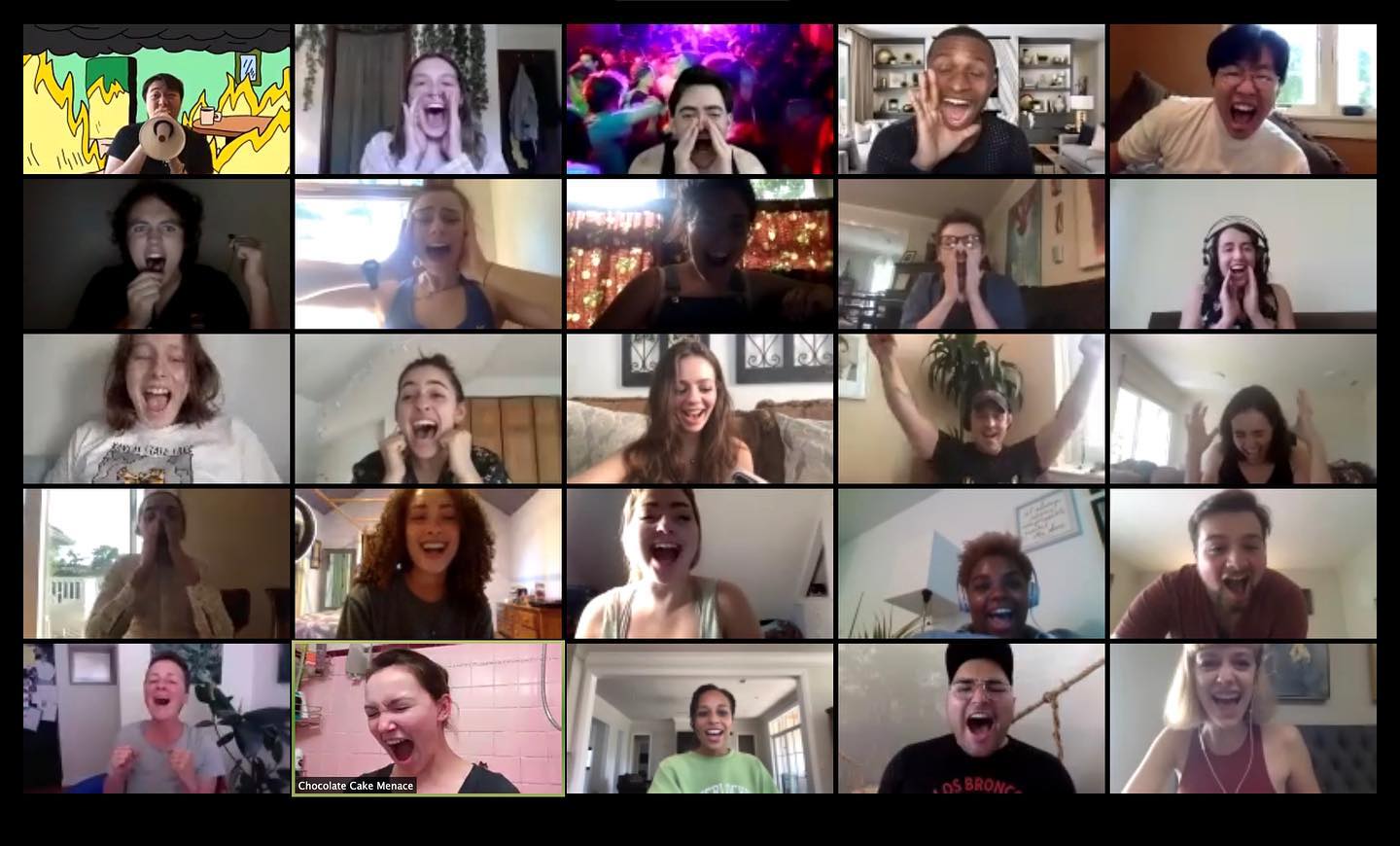
CM: In the text itself, there is a common theme of drinks, fluidity, water. You mention shower water, coffee, alcohol. What is the reason behind fixating on drinks and substances?
KL: The alcohol is my current situation. I’m in a situation where I’m actually not permitted to drink. But when you’re isolated like this, and you’re alone, you don’t have a whole lot to do. And I think any UChicago student can attest to drinking copious amounts of coffee at various cafes when they were open. It helps pass time, and we always drink too much coffee. I remember ordering five cups of coffee in an hour while in Harper Library to keep myself engaged. For both coffee and alcohol, I’ll say that when you’re in a situation like the pandemic, some people are driven to take comfort in—for the lack of a better word—substances. I think it’s important to acknowledge the role that decision can play. Why is it that you’re taking some sort of risk by trying to distract yourself?
What I would like to say is that there’s no intentional point, but it’s just really reflecting my own actual experiences. I’m still a coffee and caffeine addict. If you can draw from my experiences, I hope that is why PRIMAL resonates.
CM: PRIMAL is public domain. Do you see this play being translated to a post-pandemic setting?
KL: Does it exist in a post-pandemic setting? Can it? A lot of what I write is very much written for the moment, and in-the-moment. For some, that might make them think, “Is there longevity for pieces like this in the future after the moment is gone?” Honestly, I’m okay with it not lasting past one particular moment.
The main reason I put it in the public domain is because I think my experiences with this pandemic are reflected in others’ experiences. I think everyone has had that kind of primal urge to scream about all that’s happening and all that continues to happen. If this play gives people a chance to release that urge, then what I’ve done is something good for this world.
CM: Is there anything you learned from this process of creating virtual theater over the course of the pandemic that you took to heart and will continue to keep using?
KL: I think it’s just that art is highly malleable. I've always thought of theatre as something that relies on an audience being present in the moment for the performers to respond to. It is absolutely how I've thought about everything I've written. When I write straightforward, full length plays, or even 10-minute plays, I'm imagining an audience responding in my head. And what I've had to contend with in the virtual space is that sometimes you don’t have that audience. So, it's, it's about creating things that audiences can respond to without necessarily being completely vocal. I also think one big takeaway I've gotten from this is that just because you can't hear or see the audience doesn't mean they're not there. As long as you're putting on something for them, regardless of whether you're getting something back in-the-moment from them, you can still touch people's lives in some way.
CM: And what other projects are you working on right now or planning on doing in the future?
KL: I just wrapped up [Socially Away: A Studio Ghibli Podcast]! Right now, I’m at the Eugene O’Neill Theater Center. I’ve got two full length plays in the works, one that is a finished draft. I can’t say a whole lot about it! But we are talking in terms of physical performance. It might be put on in a physical space, like a reading or a workshop. I also wrapped up a residency with the Citadel of Playwrights. They’re based in Dallas and I was their first artist-in-residence. I also have a YouTube channel where I make puppet videos, Soft-Shell Productions. It’s a remote way of producing material to present to people…In a loose way, this is like getting my senior spring back.
Thank you for indulging us, Kenjiro.
Kenjiro Lee is a New Jersey-based playwright, director, puppeteer, and performer. He graduated from the University of Chicago in 2020 with a major in Political Science and minor in Theater and Performance Studies.
PRIMAL is open to the public domain at https://www.kenjirolee.com/playwriting. Find more of Lee’s works at Soft-Shell Productions, https://www.kenjirolee.com/, and Socially Away: A Studio Ghibli Podcast.



